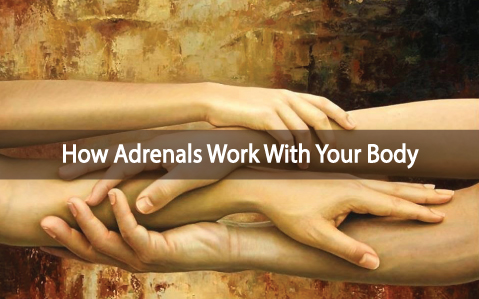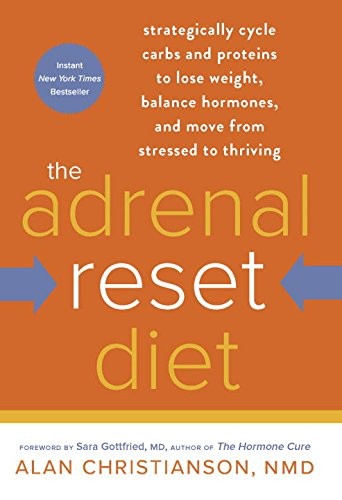
Dr. Stephen Gangemi, Guest
Thyroid Nation
Adrenals
No hormone in the body can work optimally on its own. It’s common in today’s medical mindset to try to isolate a problem by only looking at where there is dysfunction and not take into account how an organ will be influenced by another organ and in turn, influence others.
Take, for example, you’re sitting at the airport in Atlanta waiting for your plane but it’s delayed several hours due to a storm at its departure airport in Detroit. Though the storm is hundreds of miles away it’s affecting you even though the problem isn’t in Atlanta. Conventional methods will look to fix the problem in Atlanta rather than see if it’s a result of something or somewhere else. The same process happens often in our bodies with one system affecting another which in turn has an effect somewhere else. Let’s look at some common examples.
Blood Sugar and the Adrenals
The adrenal glands work with the pancreas to balance and regulate blood sugar. When you eat some carbohydrates (sugar), insulin from the pancreas helps to lower blood glucose levels. Yet when you need more sugar in your blood stream, it’s the adrenals responsibility to secrete epinephrine or cortisol to either release some stored sugar (glycogen) or make it from some protein (amino acids). Many people feel like their blood sugar is dropping and they’re hypoglycemic yet when they stick themselves to get a drop of blood to test their glucose level, it’s perfectly normal. This is often due to a high cortisol level which is impairing that glucose from getting into the tissues. If you crave sugar then be assured that your adrenal glands are fatigued; it’s a sign that your adrenal-pancreas balance is not functioning optimally.
Thyroid Problems and the Adrenals
 Thyroid gland problems are one of the most common endocrine disorders of present day. They’re as much of a diagnosed health problem today as pancreas problems (diabetes). The interaction of the thyroid and adrenals is very unique and very important to maintain health. When the adrenal glands are chronically stressed, eventually the thyroid hormone levels begin to drop and soon the person is told they have hypothyroidism and they need to go on a medication such as Synthroid. And if the adrenal glands are very fatigued, the thyroid may secrete more hormone to help provide the body with energy, resulting in a temporary hyperthyroid problem. Also, cortisol blocks the conversion of thyroid hormone T4 to T3, which can result in the body making more T4 and eventually lead to a thyroid disorder. Many people on thyroid meds continue to suffer from adrenal gland problems yet they constantly feel the need to increase their thyroid medication to give them sufficient energy where in reality they should be dealing with the adrenal issue.
Thyroid gland problems are one of the most common endocrine disorders of present day. They’re as much of a diagnosed health problem today as pancreas problems (diabetes). The interaction of the thyroid and adrenals is very unique and very important to maintain health. When the adrenal glands are chronically stressed, eventually the thyroid hormone levels begin to drop and soon the person is told they have hypothyroidism and they need to go on a medication such as Synthroid. And if the adrenal glands are very fatigued, the thyroid may secrete more hormone to help provide the body with energy, resulting in a temporary hyperthyroid problem. Also, cortisol blocks the conversion of thyroid hormone T4 to T3, which can result in the body making more T4 and eventually lead to a thyroid disorder. Many people on thyroid meds continue to suffer from adrenal gland problems yet they constantly feel the need to increase their thyroid medication to give them sufficient energy where in reality they should be dealing with the adrenal issue.
Sex Hormones, Pregnancy, and the Adrenals
DHEA, which is secreted by the adrenal glands, (as well as around 5% by the testes/ovaries too), is the most abundant steroid hormone our body makes. DHEA further converts primarily into testosterone in men and estrogen in women. If the adrenals are not functioning well then sex hormone production will eventually be influenced as there is not enough DHEA to make the hormones. Yet, there is often a greater problem of high cortisol levels robbing the necessary building blocks of these hormones as a person uses many of those same substrates (vitamins and minerals) to make the cortisol to deal with the stress that they also need to make DHEA, estrogen, progesterone, and testosterone.
So if a man is under too much stress then his body will use up the precursors necessary for testosterone to now make cortisol, and subsequently DHEA and testosterone levels will fall. In a woman, a similar situation will happen with estrogen (from DHEA) but even more with progesterone which can not only result in health and sexual problems but also pregnancy issues too. Essentially rather than produce sufficient progesterone she’ll make cortisol to deal with the stress problems in her life.
During the menstrual years, about one-third of a woman’s testosterone comes from her adrenal glands, (the other two-thirds is from the ovaries). In menopause, her progesterone and testosterone levels will be determined by sufficient adrenal gland output. The adrenals, along with the liver and fatty tissue, should also provide a woman with sufficient estrogen levels during menopause. Unfortunately many women’s adrenal glands are functioning so poorly that they cannot make the proper amounts of hormones to keep her healthy during those years.
In the follicular (preovulatory) phase of a woman’s cycle, the progesterone primarily comes from the adrenal glands, not the ovaries (they provide progesterone during the second half of the cycle – the luteal phase). Therefore, if the adrenal glands are not functioning properly then a woman can suffer symptoms of low libido, ovulation problems, and especially PMS. Furthermore, a woman with adrenal gland problems suffering from sub-optimal progesterone levels will often have trouble getting pregnant and she is also at risk of a first trimester miscarriage as sufficient progesterone levels are of utmost importance during this time. Unfortunately, most OBGYN doctors do not realize the importance of the adrenal glands when investigating pregnancy or conception complications.
A fetus’s adrenal glands are developing during the third trimester and if the mother has suffered from excessive stress and her adrenal gland function is hindered, then she can begin to draw from the baby’s hormonal levels. This will result in the mother feeling physically and mentally great in the third trimester, (often better than the first two trimesters). But unfortunately the story does not often end well as it’s a main reason for postpartum depression for the mom, (she no longer has those adrenal reserves once the baby is born), and the newborn is now left with fatigued adrenal glands which often manifests itself with health problems such as allergies and asthma.

Sleep, the Pineal Gland, and the Adrenals
The pineal gland sits deep in the center of the brain and produces melatonin, which regulates our sleep-wake cycle. Much like the circadian rhythm of the adrenal glands, the level of melatonin normally fluctuates during a 24-hour period. Melatonin levels should be highest at night, opposite those of cortisol, and lowest in the morning, when cortisol rises to its highest level of the day.
Abnormal melatonin-cortisol rhythms result in problems with sleep. Often with insomnia, cortisol levels are much higher than what they should be at that time of the night, and their suppression of melatonin results in the person being unable to fall asleep. Spikes in cortisol and/or epinephrine in the middle of the night, often as a result of blood sugar dysregulation, will cause the person to wake up and perhaps unable to get back to sleep depending on the severity of the hormonal spike.
The Heart, Blood Pressure, and the Adrenals
 As mentioned previously, the hormone aldosterone secreted by the adrenal glands has a major effect on the blood pressure as well as the function of the entire cardiovascular system. An imbalance of electrolytes, regulated by the adrenal glands, can result in an abnormal heart rhythm, often either a racing heart rate or heart beat palpitations which many describe as a “flip-flop”. This is often due to an imbalance of sodium and potassium levels in the body, which can be due to poor adrenal gland function. Of course it’s wise to always have any heart problem checked out by your physician.
As mentioned previously, the hormone aldosterone secreted by the adrenal glands has a major effect on the blood pressure as well as the function of the entire cardiovascular system. An imbalance of electrolytes, regulated by the adrenal glands, can result in an abnormal heart rhythm, often either a racing heart rate or heart beat palpitations which many describe as a “flip-flop”. This is often due to an imbalance of sodium and potassium levels in the body, which can be due to poor adrenal gland function. Of course it’s wise to always have any heart problem checked out by your physician.
Many blood pressure medications directly impact these electrolyte levels. HCTZ is a common blood pressure med that acts as a diuretic, lowering potassium levels. ACE inhibitor medications such as Lisinopril effectively lower aldosterone levels and therefore decrease sodium levels which in turn lower blood pressure. Many high blood pressure patients are unfortunately prescribed multiple medications as a shot-gun approach; they’re taking diuretics which deplete potassium, ACE inhibitors which deplete sodium, and even calcium channel blockers which displace calcium. Chronic electrolyte depletion, especially over time, can result in many health problems ranging from fatigue, to muscle cramps and joint pain, to even cardiovascular problems which they were prescribed to initially prevent. Of course this is does not mean you should stop or alter your medication without the advice of your prescribing physician. But it does mean that you should be informed about your health and the effects of medications on your health, both positive as well as negative.
In the fourth and final part of this adrenal gland series, I discuss steps you can take to recover from adrenal gland dysfunction or fatigue. After all, knowing that your adrenal glands are not working well does you no good if you don’t know how to correct the problem!
About the Author
 Dr. Stephen Gangemi received his doctorate degree in chiropractic and bachelor degree in nutrition from Life Chiropractic University in Marietta, GA. He is constantly staying up-to-date with current health research and information while managing a full-time patient practice. Merging functional neurology and nutritional biochemistry into mainstream natural health care is the essence of what he does. It’s a very patient-individualized practice! He is certified in applied kinesiology and is a Diplomate of the International Board of Applied Kinesiology. Check out his website, here. Be sure to follow him on Twitter and Facebook.
Dr. Stephen Gangemi received his doctorate degree in chiropractic and bachelor degree in nutrition from Life Chiropractic University in Marietta, GA. He is constantly staying up-to-date with current health research and information while managing a full-time patient practice. Merging functional neurology and nutritional biochemistry into mainstream natural health care is the essence of what he does. It’s a very patient-individualized practice! He is certified in applied kinesiology and is a Diplomate of the International Board of Applied Kinesiology. Check out his website, here. Be sure to follow him on Twitter and Facebook.
Questions or anything to add about your adrenals? We want your thoughts in the comments section–Please!




Any good livr clense
I’m not sure. I have to be careful so, I don’t know.
Sorry!
~Danna